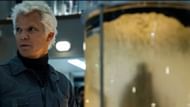Alien: Earth arrived on FX and Disney like a ship crashing through known space. The series takes viewers back to 2120, just two years before the crew of the Nostromo would encounter their nightmare on LV-426.
But this is not just another retelling of the same horror fiction. The creator, Noah Hawley, has crafted something that occupies an interesting position within the series' timeline.
The show introduces new layers to a universe fans thought they understood completely. It explores how the creatures first arrived on Earth and what corporations were willing to do for power. While some debate whether Alien: Earth fits into official canon or exists as a parallel story, the series does not contradict established events from films like Prometheus or Alien.
Instead, it fills gaps and adds context that alters how viewers perceive the entire saga. The revelations presented throughout the season fundamentally alter viewers' understanding of this science fiction universe.
Alien: Earth: 5 big changes made to the original universe
1) The Xenomorphs finally reached Earth

Alien: Earth accomplishes what the central film franchise never displayed. The creatures arrived on the human planet. Former attempts in Alien vs. Predator no longer count, as those movies were removed from canon after Alien: Covenant and Prometheus reshaped the timeline.
The series reveals that Yutani commissioned the USCSS Nostromo to collect samples of alien life and transport them back to Earth. The mission brought back five different species, including the iconic Xenomorph. The damage stayed contained by the end of the season. Most incidents occurred on Neverland Island and within the Prodigy Corporation facilities. This controlled outbreak differs significantly from the chaos depicted in non-canon crossover movies.
The year 2120 marks a new milestone, as it is the year these creatures are first said to have touched down on Earth, creating a bridge between the original 1979 Alien film and the prequel films. The timeline, which shifts from 2004 to 2120, carries significant weight in understanding the franchise's chronology.
2) Weyland-Yutani's dark knowledge was revealed

One of the most unsettling revelations in Alien: Earth involves corporate awareness. The series confirms that Weyland-Yutani already knew about the Xenomorphs before the Nostromo crew was sent to investigate the problematic signal on LV-426.
Yutani herself understood exactly what these creatures could do. She likely anticipated the crew's fate. This knowledge adds an evil dimension, making it the original Alien. The corporation was not taking a gamble on an unknown threat. They were deliberately sacrificing people to secure a specimen. The series plans to explore this connection further. Hawley mentioned waiting to display what happened on the corporate side during the fateful call that diverted the Nostromo.
This context transforms Weyland-Yutani from opportunistic villains into calculated predators who have been orchestrating their moves for years. The corporation's ruthless nature becomes even more chilling with this revelation.
3) The universe became more crowded and dangerous

For years, fans assumed Xenomorphs were different in the Alien universe.Alien: Earth shattered that assumption by introducing four additional dangerous alien species alongside the Xenomorph.
The series expanded the cosmos significantly. These are not intelligent beings like the Engineers from Prometheus. They are animalistic threats that view humans as hosts or prey. One particular disturbing species, T. Ocellus, infects organisms with its vision, but the show hints at more creatures lurking in unexplored places of space.
This revelation means the galaxy is far more perilous and populated than any former film suggested. The Xenomorphs are not special anymore. They are not just one of many nightmares waiting in the dark. They are just one of many nightmares waiting in the shadows. Space becomes a hunting ground filled with unrecognizable terrors beyond human imagination.
4) Earth's corporate landscape was restructured

Alien: Earth introduces a corporate ecosystem that former movies only hinted at. Weyland-Yutani was not operating alone in their dystopian future. Four other mega-corporations controlled Earth alongside them: Dynamic, Produgy, Lynch, and Threshold.
These companies functioned more like government than business. They competed ruthlessly for advantages in resources, technology, and scientific breakthroughs. This competition explains why Weyland-Yutani pursued the Xenomorphs so aggressively. They needed an edge against enemies. The show reveals that all five corporations were moving toward the same goal of achieving human immortality. This objective drove their every decision.
Prodigy developed human and synthetic hybrids. Weyland-Yutani created advanced cyborgs. The quest for eternal life became the driving force behind all corporate activity, lending context to actions that had seemed purely sinister in earlier films. Additionally, the character Boy Kavalier's experiments with human-synthetic hybrids display this desperate pursuit of immortality.
5) David's role in Xenomorph creation was clarified

Prometheus and Alien: Covenant suggested that the android David might have created the Xenomorphs through his genetic work. Alien: Earth settles this debate forever. The Xenomorph existed long before David started his work. The Maginot collected its Xenomorph specimen around 2087, six years before David even learned about the species in 2093. This timeline proves the creatures are ancient, not synthetic creations.
David may have engineered variations like the Protomorph, but he did not birth the former species. Evidence supporting this existed in Prometheus, as seen in the Engineer murals, which depicted Xenomorph-type creatures.
Alien: Earth easily confirms what careful audiences suspected. The creatures have their own evolutionary history independent of synthetic interference. The revelation respects the legacy developed by former installments.
Alien: Earth reshaped fundamental aspects of the franchise through bold narrative choices. The series introduced viewers to new creatures, provided clarity on the timeline, and explored corporate dynamics that enrich the entire universe. It transformed understanding forever.
